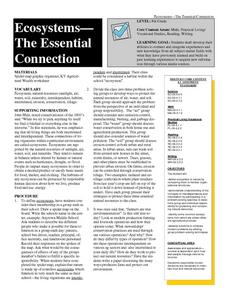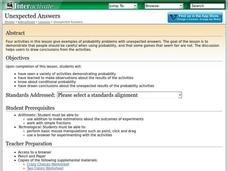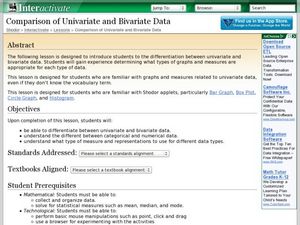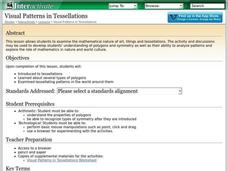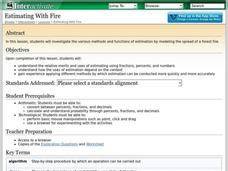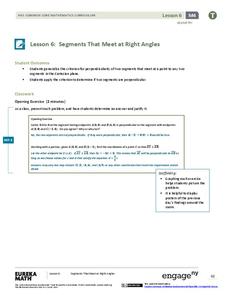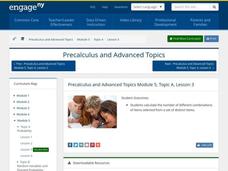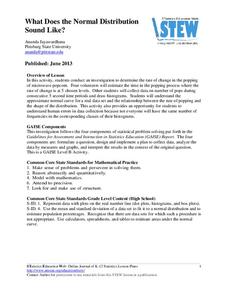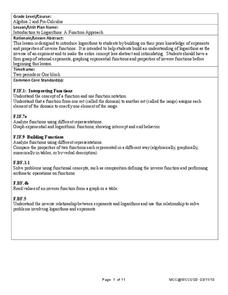Curated OER
Ecosystems-The Essential Connection
Young scholars develop their abilities to solve problems both in school and in a variety of situations similar to that they have encountered in life. They define the term ecosystem in nature by comparing them to familiar organizational...
Curated OER
Interactivate: Introduction to Functions
This interactive website provides a variety of lesson plans according to which standards you are applying and which textbook you use. Introduce functions to your class by having them construct single operation machines and create...
Curated OER
Reading Graphs
Working independently or in teams, your class practices connecting graphs, formulas and words. This instructional activity includes a guided discussion about distance vs. time graphs and looking at how velocity changes over time.
Curated OER
Unexpected Answers
Young scholars explore the concept of fairness. In this fairness lesson, students play four probability games. Young scholars determine who has the best chance of winning each of the four games. Students discuss which games gave an...
Curated OER
Comparison of Univariate and Bivariate Data
Learners explore the concept of univariate and bivariate data. For this univaritate and bivariate data lesson, pupils discuss the differences between univariate and bivariate data. They work sample problems where they must construct box...
Shodor Education Foundation
Visual Patterns in Tessellations
Geometers explore the concept of tessellations. They use a tessellation applet to manipulate shapes and design their own tessellation using the applet.
Curated OER
Linear Regression and Correlation
Learners explore scatter plots. In this linear regression lesson, groups of pupils graph scatter plots and then find the line of best fit. They identify outliers and explain the correlation. Each group summarizes and shares their...
Curated OER
Area and Perimeter Floor Plan
Using Google SketchUp, learners draw a model of their bedroom. They begin by measuring the dimensions of their bedroom, inputting this information into the software program, and calculating perimeter and area. This is an interesting and...
Shodor Education Foundation
Pythagorean Theorem
Most adults remember learning about the Pythagorean theorem, but they don't all remember how to use it. The emphasis here is on developing an intuitive understanding of how and when to use the theorem. Young mathematicians explore...
Shodor Education Foundation
Algorithm Discovery with Venn Diagrams
Here is a lesson that takes an interesting approach to analyzing data using box and whisker plots. By using an applet that dynamically generates Venn diagrams, the class forms a strategy/algorithm for guessing the rule that fits...
Association for Supervision and Curriculum Development (ASCD)
Interpreting Algebraic Expressions
The title of this instructional activity should be "Algebraic Expressions Four Ways." Not only will your class be translating verbal descriptions of algebraic expressions to symbols, but also working with their geometric interpretation...
Shodor Education Foundation
Estimating With Fire
Watch the damage from a forest fire in this interactive simulation activity that challenges learners to estimate the burn area using different approaches. Learners are given a worksheet to track the different burn patterns and practice...
Shodor Education Foundation
Triangle Area
While the lesson plan focuses on right triangles, this activity offers a great way to practice the area of all triangles through an interactive webpage. The activity begins with the class taking a square paper and cutting in in half; can...
EngageNY
Segments That Meet at Right Angles
Can segments be considered perpendicular if they don't intersect? Learners look at nonintersecting segments on the coordinate plane and make conclusions about the lines that contain those segments. They determine if they are...
Discovery Education
Future Fleet
Turn your pupils into engineers who are able to use scientific principals to design a ship. This long-term project expects pupils to understand concepts of density, buoyancy, displacement, and metacenter, and apply them to constructing a...
EngageNY
Construct and Apply a Sequence of Rigid Motions
Breaking the rules is one thing, proving it is another! Learners expand on their previous understanding of congruence and apply a mathematical definition to transformations. They perform and identify a sequence of transformations and use...
EngageNY
Counting Rules—Combinations
Discover how combinations are different from permutations. In the third installment of a 21-part module, scholars learn how to determine combinations of objects. They learn to distinguish between situations where order is important and...
Institute of Electrical and Electronics Engineers
Playing with Parachutes
This lesson certainly will not be a drag! Little engineers design parachutes that make use of air resistance and, as a result, slow the descent of the payload as much as possible. It is an opportunity to teach about many motion concepts:...
Growing Minds
Apple Exploration
Turn your classroom into a farmers' market! Reading Applesauce Season by Eden Ross Lipson or Monica Wellington’s Apple Farmer Annie, launches this investigation of apples, farmers' markets, and the people selling products. The class...
Statistics Education Web
What Does the Normal Distribution Sound Like?
Groups collect data describing the number of times a bag of microwave popcorn pops at given intervals. Participants discover that the data fits a normal curve and answer questions based on the distribution of this data.
Illustrative Mathematics
Operations on the Number Line
A different way to look at integers is on this number line with variables in place of numbers. Learners are to look at different expressions and describe why they think the answer would be positive or negative, depending on the location...
West Contra Costa Unified School District
Introduction to Conditional Probability
Here is a turnkey lesson that walks young statisticians through the development and uses of conditional probability. From dice games to surveys, Venn diagrams to frequency tables, the class learns how a given can effect the overall...
West Contra Costa Unified School District
Introduction to Logarithms
Build on pupils' understanding of inverse functions by connecting logarithmic functions to exponential functions. This activity allows individuals to see graphically the inverse relationship between an exponential and logarithmic...
West Contra Costa Unified School District
Writing Exponential Functions Based on Data
Give your class a concrete example of exponential growth and decay using this hands-on activity. These Algebra II lessons allow for the exploration of exponential growth and decay models, as well as the discovery of the patterns of...
Other popular searches
- Common Core Math
- Common Core Math Lessons
- Math Common Core Lesson Plans
- Math Common Core Standards
- Common Core Kindergarten Math
- Common Core Math Fractions
